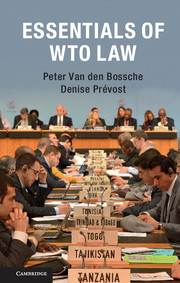Book contents
- Frontmatter
- Contents
- List of figures and tables
- Preface
- List of abbreviations
- Table of cases
- 1 International trade and the law of the WTO
- 2 Rules on non-discrimination
- 3 Rules on market access
- 4 Trade liberalization and other societal values and interests
- 5 Rules on unfair trade
- 6 Rules regarding harmonization of national regulation
- 7 The institutional aspects of the WTO
- 8 The WTO dispute settlement system
- Online resources
- Index
Preface
- Frontmatter
- Contents
- List of figures and tables
- Preface
- List of abbreviations
- Table of cases
- 1 International trade and the law of the WTO
- 2 Rules on non-discrimination
- 3 Rules on market access
- 4 Trade liberalization and other societal values and interests
- 5 Rules on unfair trade
- 6 Rules regarding harmonization of national regulation
- 7 The institutional aspects of the WTO
- 8 The WTO dispute settlement system
- Online resources
- Index
Summary
This book was motivated by the need for an accessible text providing a brief overview of the law of the WTO, which we both encountered in our own teaching and were alerted to by colleagues. As WTO law continues to gain in importance, its role in curricula is no longer limited to graduate programmes at law faculties. Instead, the study of WTO law is increasingly an integral part of graduate programmes at other faculties, undergraduate law programmes, summer schools and training programmes for government officials and other professionals. While teachers and students of graduate courses on WTO law have a choice of many excellent textbooks, providing a detailed examination of this increasingly complex area of law, the specific needs of teachers and students of undergraduate courses and courses outside the law faculty are less well served.
This book aims to fill this gap by providing a succinct introduction to the main aspects of WTO law. It provides a systematic, carefully considered discussion of the legal framework, incorporating key clarifications from the case law, that is sufficient to give the reader a strong foundation in the main aspects of WTO law. For a detailed discussion of WTO law, we refer the reader to Peter Van den Bossche and Werner Zdouc, The Law and Policy of the World Trade Organization, 3rd edition (Cambridge University Press, 2013).
We have drawn on many years of experience in teaching WTO law to a wide variety of audiences to write a text that aims both to stimulate the interest of students in the field of WTO law and to facilitate their learning process. To this end, this book includes fictional illustrative examples where useful to clarify key concepts and important issues and show their practical application. Recommendations for further reading complement the text and enable students to gain a more in-depth understanding of current debates and critical analysis of the issues discussed in the book. An online resources section provides students with the tools they need to work within this field.
This book reflects the current state of WTO law (as of 1 December 2015). Although we mention legal issues still to be adjudicated, we do not express in this book any opinion on how these issues should be decided or, more broadly, how WTO law should develop in the future.
- Type
- Chapter
- Information
- Essentials of WTO Law , pp. ix - xPublisher: Cambridge University PressPrint publication year: 2016



